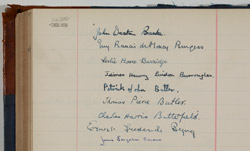‘The Distemper of the Thirties’: The Cambridge Spies

Guy Burgess’s signature in the University matriculations register, 1930. Cambridge University Archives, Matr.21.
Between 1926 and 1934, five young men—Anthony Blunt, Guy Burgess, Donald Maclean, Kim Philby and John Cairncross—came up to Cambridge University. All except Cairncross were products of the British professional classes; all on graduation began to make their ways in the establishment as civil servants, academics or journalists; and by the end of 1940, all had been recruited into either the Foreign Office or the British security services. All betrayed their country by passing secrets to the Soviet Union, having been recruited by agents of the NKVD (the forerunner of the KGB) between 1934 and 1937.
Their motives for treachery were ideological rather than financial. The allure of Marxism was widely felt by British intellectuals in the decades following the Russian Revolution, and in the guise of Soviet Communism it seemed to offer not merely an alternative to the ineffectuality of the established British political parties in dealing with the social and economic difficulties of the inter-war years, but also a bulwark against Italian, Spanish and German Fascism.
